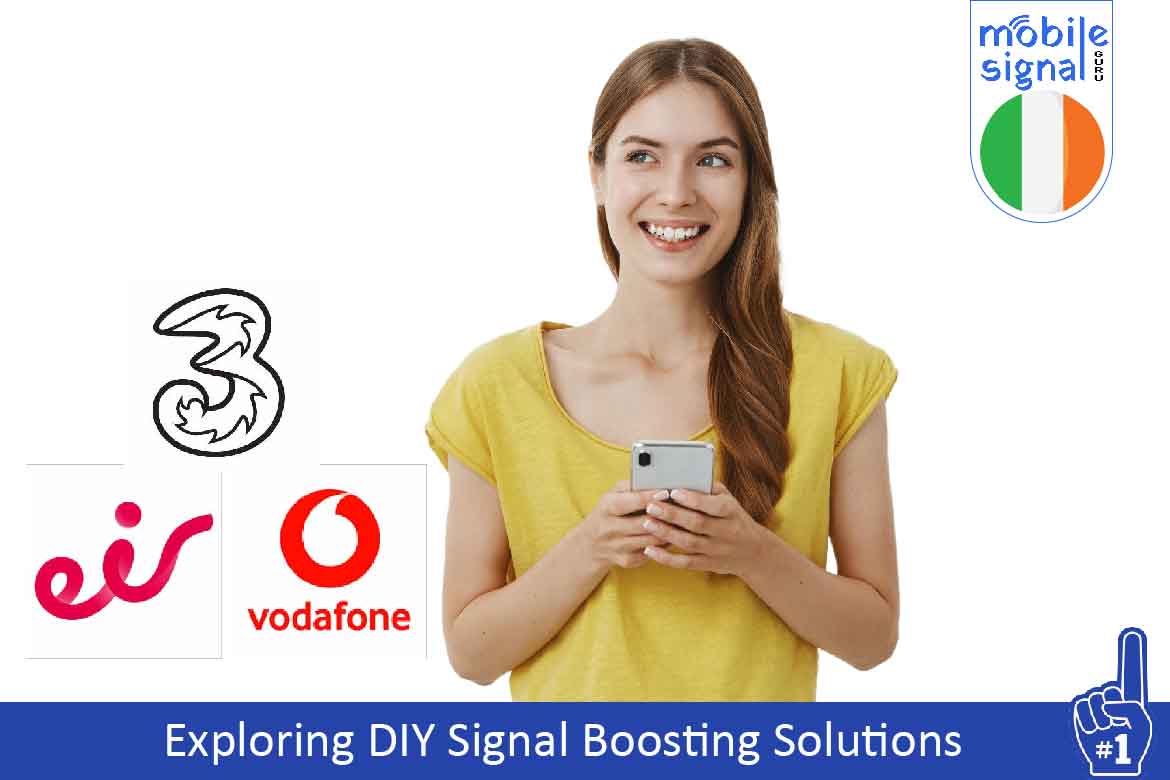In today’s digital world, a strong mobile signal is essential. Whether you’re trying to make an important call, stream content, or work remotely, a weak signal can be incredibly frustrating. This is especially true in areas with poor coverage, such as rural regions or even within certain buildings. Fortunately, DIY mobile signal boosting solutions can help you improve call quality and mobile data speeds. In this article, we will explore how to use mobile signal boosters to boost your mobile signal in Ireland.
What is a Mobile Signal Booster?
A mobile signal booster is a device that amplifies weak signals from nearby cell towers. These boosters work by receiving the existing signal, amplifying it, and then transmitting the improved signal to areas with weak reception. The result is better call quality, faster mobile data speeds, and fewer dropped calls.
Mobile signal boosters are especially useful in Ireland, where certain rural areas or indoor locations may struggle with consistent signal coverage. With the right signal booster, you can enjoy a stronger and more reliable connection for both calls and data.
Why Should You Consider Using a Signal Booster?
There are several reasons why you might need a signal booster in Ireland. The most common include:
1. Poor Network Coverage
In some parts of Ireland, particularly in rural or remote areas, mobile network coverage can be unreliable. This makes it difficult to use mobile phones for basic functions, such as making calls or sending texts. Signal boosters can solve this issue by improving reception in these areas.
2. Indoor Signal Issues
Many homes, offices, or buildings in Ireland may have poor indoor mobile signal strength. Thick walls, metal frames, and other materials can block or weaken the signal from outside. Signal boosters can help by amplifying the outside signal inside the building, allowing you to enjoy a stronger connection indoors.
3. Slow Data Speeds
With the growing demand for high-speed mobile data, having a reliable and fast internet connection is crucial. If you live in an area with weak signal strength, your mobile data speeds might be slow, causing delays when streaming videos, browsing the web, or using apps. A signal booster can help improve your mobile data speeds.
4. Better Call Quality
Weak mobile signals often lead to poor call quality, resulting in dropped calls, lagging conversations, or unclear audio. By boosting the signal, you can enjoy clearer and more reliable phone calls.
How Do Signal Boosters Work?
Signal boosters work through three main components:
1. The External Antenna
The external antenna captures the existing mobile signal from nearby cell towers. The antenna is usually installed outside the building, where the signal is stronger. This is where the signal booster starts its process.
2. The Signal Booster
Once the signal is captured by the external antenna, it is sent to the signal booster. The booster amplifies the signal and makes it stronger. This ensures that even areas with weak coverage can receive a better signal.
3. The Internal Antenna
After the signal is boosted, the internal antenna transmits the improved signal inside the building. This allows your mobile device to connect to the stronger signal, improving both call quality and data speeds.
Types of Mobile Signal Boosters
There are several types of mobile signal boosters available in the market. Depending on your needs and the area you want to cover, you can choose the right one for your home or office.
1. Home Signal Boosters
These boosters are designed for residential use. They come with a small external antenna, which can be mounted on the roof or another high point. The internal antenna then distributes the boosted signal throughout your home.
2. Office Signal Boosters
Office boosters are more powerful than home boosters. They are ideal for medium-sized commercial spaces that need to boost mobile signals for multiple users. These boosters can improve reception in larger areas like offices, shops, and warehouses.
3. Vehicle Signal Boosters
If you spend a lot of time traveling by car, you may experience poor mobile signal in some areas. Vehicle signal boosters are designed to amplify signals while you’re on the move. These boosters are typically installed in your car and can improve call quality and mobile data speeds during your commute.
4. Portable Signal Boosters
Portable signal boosters are smaller, lightweight devices that you can carry with you. These are ideal for people who frequently travel to areas with poor signal. They can amplify the signal in a limited area, such as a small room or hotel room.
Key Features to Look for in a Signal Booster
When choosing a mobile signal booster, there are a few important factors to consider. Here are some features you should look for:
1. Coverage Area
Different signal boosters cover different areas. Some are designed to boost signals in small rooms, while others can cover entire homes or offices. Be sure to choose a signal booster that matches the size of the area you want to cover.
2. Compatibility with Mobile Networks
It’s crucial to choose a signal booster that is compatible with the mobile networks used in Ireland. Most of our mobile signal boosters support 2G, 3G, 4G and 5G networks. However, if you’re looking for 5G coverage, you should ensure that the booster supports this network as well.
3. Strength of Signal Boost
The signal booster should be capable of amplifying signals to a sufficient strength. A weak booster may not provide enough improvement to make a noticeable difference. Check the product specifications to ensure the booster is powerful enough to meet your needs.
4. Ease of Installation
Some signal boosters require professional installation, while ours are designed for DIY setups. DIY signal boosters are generally easier to install and come with clear instructions. Choose a booster that you feel comfortable installing yourself.
5. Price
Prices for signal boosters can vary widely, depending on the type and strength. It’s important to set a budget and compare different options. While cheaper options may be tempting, remember that higher-quality boosters often deliver better and more reliable results.
How to Install a DIY Signal Booster in Your Home or Office
Installing a DIY signal booster is usually straightforward, but it does require some basic knowledge. Here are the general steps for installation:
1. Select the Right Booster
Before you start, make sure you choose the right signal booster for your needs. Consider the size of the area you want to cover, the type of mobile network you use, and your budget.
2. Install the External Antenna
The external antenna needs to be placed in an area where the signal is strong. This is typically on the roof, near a window, or on a high outdoor wall. Make sure the antenna is positioned in the direction of the nearest mobile tower for the best reception.
3. Connect the Booster to the Antenna
Next, connect the external antenna to the signal booster. This step involves running a cable from the antenna to the booster, which should be placed in a central location within your home or office.
4. Place the Internal Antenna
The internal antenna should be placed where you need coverage, such as in the living room or office. This antenna will transmit the boosted signal throughout the space.
5. Power the Booster
Finally, plug the booster into an electrical outlet and power it on. Check the signal strength on your mobile device to ensure that the booster is working properly.
6. Test the Signal
Once installed, test the mobile signal to ensure it’s stronger. Move around your space, checking call quality and data speed in various locations.
Benefits of Using a DIY Signal Booster
There are several advantages to using a DIY signal booster:
1. Cost-Effective Solution
Compared to expensive professional installation services, DIY signal boosters are a much more affordable option. You can install the booster yourself without the need for professional help, saving both time and money.
2. Improved Mobile Signal
DIY boosters can provide immediate improvements in mobile signal strength. With a better signal, you will experience clearer calls, faster data speeds, and fewer dropped calls.
3. Convenience
Once installed, signal boosters are easy to use. There’s no need for complicated adjustments, and you can enjoy enhanced mobile service right away.
4. Increased Productivity
With stronger signals and faster data speeds, you’ll be able to work more efficiently, whether it’s making a business call or accessing important information online.
Conclusion
In Ireland, where mobile signal coverage can vary, especially in rural areas, DIY signal boosting solutions offer a practical and cost-effective way to improve mobile call quality and data speeds. By investing in a reliable mobile signal booster, you can enjoy better connectivity, faster data speeds, and clearer calls. The installation process is simple, and the benefits are immediate, making signal boosters a great option for anyone struggling with weak mobile reception.
 Australia (AUD)
Australia (AUD) Denmark (DKK)
Denmark (DKK) France (EUR)
France (EUR) Germany (EUR)
Germany (EUR) Malta (EUR)
Malta (EUR) Netherlands (EUR)
Netherlands (EUR) New Zealand (NZD)
New Zealand (NZD) Norway (NOK)
Norway (NOK) Spain (EUR)
Spain (EUR) Sweden (SEK)
Sweden (SEK) UAE (AED)
UAE (AED) United Kingdom (GBP)
United Kingdom (GBP) Global Site (USD)
Global Site (USD)
